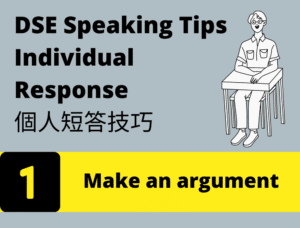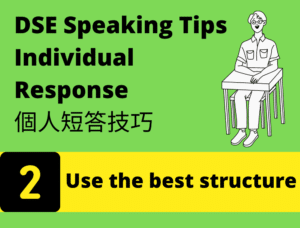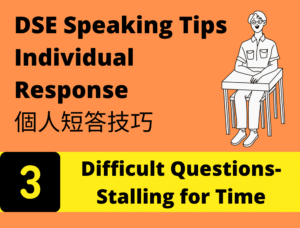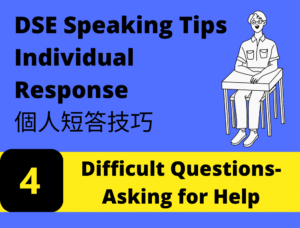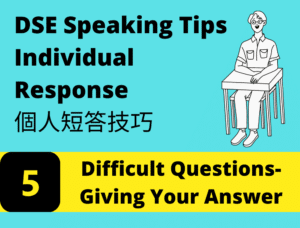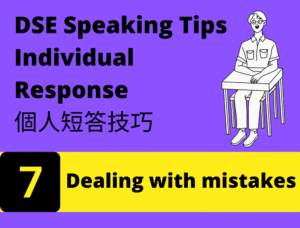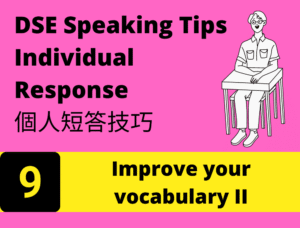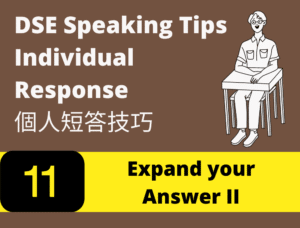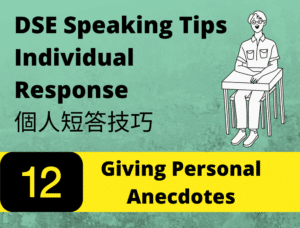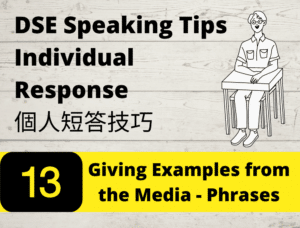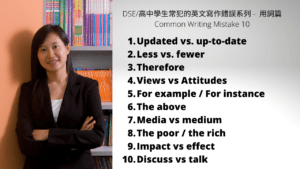[catch-breadcrumb]
DSE Speaking one-minute response 12個貼士
DSE Speaking Tips Video 包括
DSE Speaking Tip 1: Making an argument
When giving your answer, have a strong opinion.
Don’t make your answer balanced: make it an argument.
Give one single, strong message with examples and reasons to support your opinion.
First and last sentences should summarise this view.
DSE Speaking Tip 2: Using the Best Structure
Structure your answer like an essay
Time (roughly)
| 10 seconds | Stance/brief answer |
| 20 seconds | Reason 1 + explanation/example |
| 20 seconds | Reason 2 + explanation/example |
| 10 seconds | Concluding sentence |
DSE Speaking Tip 3: Difficult Questions: Stalling for Time
Sometimes you’re asked a difficult question. Here are tips from the examiners reports to help you to get more time to think about your answer.
- Don’t use stock phrases to start your answer.
- Repeat back the question to have some more time to think.
DSE Speaking Tip 4: Difficult Questions: Asking for Help
If you don’t understand the question, here are some phrases you can use to ask for clarification: to check what a difficult part of the the question means.
This is better than asking the examiner to repeat the question, or just guessing the answer.
Phrases to learn in this video:
- Sorry, do you mean…
- When you say […], do you mean…
- Sorry, could you explain what you mean by…
- Just to be clear, are you asking me about…
DSE Speaking Tip 5: Difficult Questions: Giving Your Answer
Here are some phrases you can use if you want to show that the question is difficult. These are natural English phrases that native speakers use all the time, if they are not sure of what to say.
Phrases to learn in this video:
- I’m no expert/scientist/economist (etc.), but I think…
- I’m not very familiar with this topic, but I’d say that…
- I’m not sure, but off the top of my head…
- In my limited experience…
DSE Speaking Tip 6: Improving Your Fluency: Tips
In the examiners reports, good fluency is described as rarely repeated oneself or having to correct mistakes, and only hesitating to think of ideas
In this video, here are some tips to help you to be more fluent:
- Use cohesive features
- Avoid long pauses
DSE Speaking Tip 7: Dealing with Mistakes
Remember: if it’s quick to correct, correct it.
If it’s a big mistake, use a natural English phrase to help you to start again.
DSE Speaking Tip 8: Improving your Vocabulary: I
Having a wide vocabulary is a good way to improve your marks.
This video is about:
- Varying the words of the question;
- Learning new ways to give your opinion
DSE Speaking Tip 9: Improving your Vocabulary: II
Having a wide vocabulary is a good way to improve your marks. This video has some more tips about how you can do this.
This video is about:
- Using adverbs;
- Using superlatives.
DSE Speaking Tip 10: Expanding Your Answer: I
Your answer will be in the form of a persuasive argument. You need to give your opinion, then give reasons and examples to support your opinion.
This is how you should try to expand your answer if you struggle to talk for a full minute.
You need to give a reason, then develop it with more arguments and examples.
DSE Speaking Tip 11: Expanding Your Answer: II
We are told as children never to lie. However, there is one occasion when you can: in your speaking exam!
It’s ok to lie if it helps you to give examples to support your answer. You are being judged on your ability to speak English, not on how truthful you are.
DSE Speaking Tip 12: Giving Personal Anecdotes
A personal anecdote is a short and interesting story about something that happened to you, about your experience of something
Giving a personal anecdote is a good way to support your arguments, and expand your answer
This video shows when it’s appropriate to do this, and teaches you some phrases you can use to do it:
- This reminds me of when…
- I’d like to tell you a personal anecdote that illustrates this point.
- I actually have first-hand/personal experience of this.
DSE Speaking Tip 13: Giving Examples from the Media: Phrases
In the examiners reports, examiners have said that they like it when students give examples from a ‘global perspective’.
As I explained in the last video, a very good way to do this is to give examples from the media, such as news stories and current affairs.
This video teaches a number of phrases that you can use to introduce examples from the media:
- A well-known example of this is…
- An example of this has been in the news recently.
- Take, for example,…
- … is all over the news at the moment.
- The recent news story about… perfectly illustrates my point.
【DSE 英文】其他作文格式
Other popular courses
